Explore the impactful amicus briefs and written statements CIEL has submitted to human rights and environmental cases at courts around the world.
International Court of Justice Advisory Opinion on the Obligations of States in Respect of Climate Change
Defining States’ Climate Obligations and ResponsibilitiesInternational Court of JusticeMarch 20, 2024
CIEL submitted a written statement to the International Court of Justice for its advisory opinion process on the obligations of States in respect of climate change, which was requested by the United Nations General Assembly. In its submission, CIEL calls on the Court to clarify State duties to present and future generations with regard to climate change, including both obligations to prevent and redress harms from climate change that disproportionately impact those least responsible for the planetary emergency. The submission outlines State obligations and the legal consequences of their breach, examining the legal framework across four key areas: 1) Applicable Law; 2) Reparations for Climate Harm ; 3) Obligations to Phase Out Fossil Fuels; 4) Rights of Future Generations. (See press statement.) |
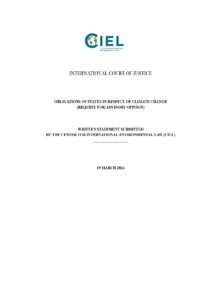 |
Inter-American Court of Human Rights Advisory Opinion on the Climate Emergency and Human Rights
Corporate Accountability in the Climate CrisisInter-American Court of Human RightsDecember 15, 2023
CIEL, along with Greenpeace International, the Union of Concerned Scientists (UCS), the Open Society Justice Initiative (OSJI), and the New York University School of Law’s Climate Law Accelerator (CLX) submitted a joint amicus brief to the Inter-American Court of Human Rights. Supporting a request for an Advisory Opinion initiated by Colombia and Chile on the urgent climate emergency and its intersection with human rights, the brief highlights the role of the fossil fuel and agroindustry sectors in exacerbating climate change. It calls for strict regulation by States and responsible conduct by businesses, aiming to address the dire human rights impacts of the climate crisis and push for corporate accountability. (See press statement.)
|
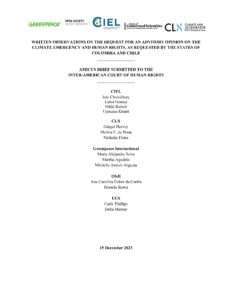 |
Challenging Fossil Fuels’ Role in Climate Change: A Legal PerspectiveInter-American Court of Human RightsDecember 18, 2023
The Fossil Fuel Non-Proliferation Treaty Initiative’s recent submission to the Inter-American Court of Human Rights illuminates the critical link between fossil fuel production and the climate crisis. Highlighting the legal and human rights issues overlooked in fossil fuel activities, the brief argues for the necessity of phasing out fossil fuels to combat global warming and protect human rights. Urging developed nations to lead with support for developing countries, this pivotal move supports a just transition away from fossil fuels, aligning with Colombia and Chile’s call for an Advisory Opinion on climate and human rights. In addition to being a member of the Treaty Initiative, CIEL provided input and assistance in the preparation of this submission.
|
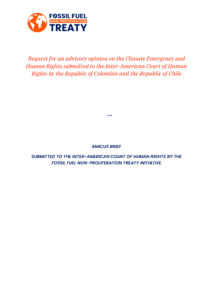 |
Call for Reparations for Climate HarmInter-American Court of Human RightsDecember 18, 2023
In a submission to the Inter-American Court of Human Rights, CIEL, La Ruta del Clima, the Inter-American Association for Environmental Defense (AIDA), and the International Network for Economic, Social, and Cultural Rights emphasized the urgent need for reparations for communities affected by the climate crisis. This amicus brief, submitted in response to the Advisory Opinion request from Colombia and Chile on climate and human rights, argues for the right to reparation in the wake of climate change, insisting that measures to address loss and damage must align with human rights obligations under international law. It urges the Court to affirm that climate actions, including the establishment of loss and damage funds, must meet human rights standards and not preclude further reparations demands. This submission marks a step toward ensuring justice and comprehensive reparations for victims of climate impacts. (Submitted in Spanish.)
|
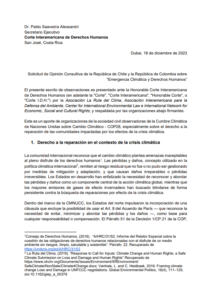 |
Strengthening Environmental Defenders’ Rights in the Climate CrisisInter-American Court of Human RightsDecember 18, 2023
A coalition of affected communities, along with environmental and human rights organizations (including the CIEL, Fundación para el Desarrollo de Políticas Sustentables, and others), submitted an amicus brief to the Inter-American Court of Human Rights. This submission, in response to the Advisory Opinion request from Colombia and Chile, focuses on the critical role of environmental and territorial defenders amidst the climate emergency and the energy transition. It argues that States, under the American Convention on Human Rights, have specific obligations to protect these defenders, including ensuring their safety, preventing attacks against them, and investigating crimes committed against them. The brief emphasizes the importance of ratifying and implementing the Escazú Agreement to bolster access rights and safeguard the work of environmental defenders, highlighting the unique vulnerabilities faced by women in these roles and advocating for gender-sensitive public policies to address the climate crisis’s impacts. (Submitted in Spanish)
|
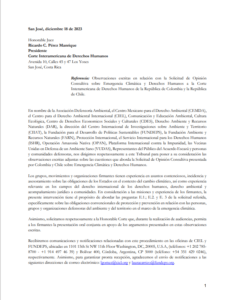 |
Manaus Declaration: A Call for Climate JusticeInter-American Court of Human RightsAugust 20, 2024
400 Indigenous and Tribal Peoples, communities, and civil society united to create the “Manaus Declaration on Human Rights in the Climate Emergency,” calling on the Inter-American Court of Human Rights to articulate minimum standards for safeguarding human rights in the context of the climate crisis and to clarify what human rights law requires of States to protect people and the environment from the most pressing crisis of our time. The declaration aims for the Court to strengthen international climate justice and guide policies toward sustainable practices. It urges the Court to adopt the strongest possible Advisory Opinion to influence future-related legal frameworks (the declaration is available in English and Spanish) |
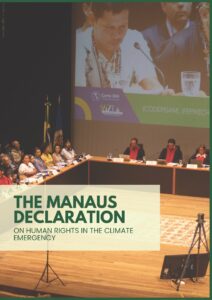
|
Colombian Constitutional Court Review on the Constitutionality of the Escazú Agreement
Advocating for Constitutionality of the Escazú AgreementConstitutional Court of ColombiaOctober 30, 2023
CIEL, submitted an amicus brief to the Constitutional Court of Colombia concerning the constitutionality of Law 2273 of 2022. This law ratifies the Escazú Agreement, a regional accord on access to information, public participation, and justice in environmental matters across Latin America and the Caribbean. In its submission, CIEL calls on the Court to support the constitutional validity of the Escazú Agreement and its approval law. CIEL’s brief highlights that the Escazú Agreement aligns with and enhances Colombia’s constitutional principles of sustainable development and the right to a healthy environment. It underscores the Agreement’s role in addressing planetary crises while reinforcing constitutional mandates. (Submitted in Spanish.) |
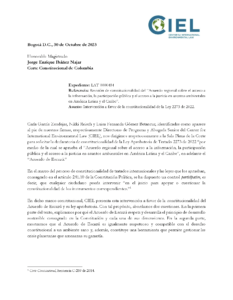
|
International Tribunal for the Law of the Sea Advisory Opinion on Climate Change and International Law
Interpreting States’ Climate Duties to Ensure Marine ProtectionInternational Tribunal for the Law of the Sea (ITLOS)June 15, 2023
CIEL, along with Greenpeace International, submitted a memorial to the International Tribunal for the Law of the Sea (ITLOS) for its advisory opinion on the scope of State responsibility concerning climate change and ocean protection, which was requested by the Commission of Small Island States (COSIS). Highlighting the urgency of the climate crisis, its origins, and its far-reaching consequences, the brief argues that greenhouse gas emissions are a form of marine pollution under the UN Convention on the Law of the Sea (UNCLOS). It urges ITLOS to interpret States’ duties to protect the marine environment in alignment with principles of international environmental and human rights law, based on the best available science, and with an emphasis on actions necessary to mitigate climate change and safeguard the oceans. The recommendations include halting new fossil fuel projects, transitioning to renewable energy, and prioritizing measures that provide immediate climate benefits rather than speculative technologies. (See perspective piece.) |
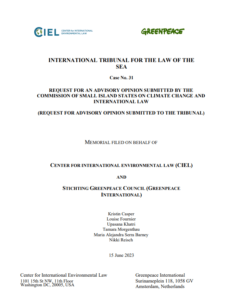
|
European Court of Human Rights Landmark Cases on State Responsibility to Prevent Climate-Related Harm
Laying Out States’ Obligations to Keep Warming Below 1.5°CEuropean Court of Human RightsDecember 5, 2022
CIEL, along with Greenpeace International and the Union of Concerned Scientists (UCS), submitted an amicus brief in the European Court of Human Rights case Duarte Agostinho et al. v. Portugal et al., in which six youth plaintiffs from Portugal argue that government climate inaction discriminates against young people and poses a risk to their lives and health. This submission underscores the international legal and scientific consensus that warming must be limited to 1.5°C, and the associated legal obligations of States on climate change. The brief argues that States’ climate action must be guided by the best available science and assessed against human rights law. It emphasizes that States must demonstrate actions that are most likely to keep warming below 1.5°C to be in line with their human rights obligations.
|
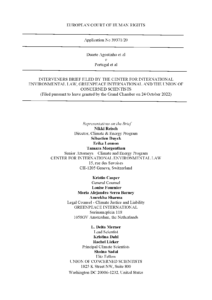
|
States’ Obligations Require Taking Proven Climate MeasuresEuropean Court of Human RightsDecember 5, 2022
CIEL along with Dr. Margaretha Wewerinke-Singh submitted an amicus brief in the European Court of Human Rights case Verein KlimaSeniorinnen Schweiz et al. v. Switzerland, brought by Swiss senior women challenging the adequacy of Switzerland’s climate policy. Against the background of current science, this brief argues that the State’s obligations under the European Convention on Human Rights to prevent foreseeable environmental and human rights harms must be interpreted consistently with science and international law. It further argues why climate policies that rely on risky and infeasible offsets and carbon dioxide removal, rather than taking robust and proven domestic emissions reduction actions, are inconsistent with the State’s human rights obligations. |
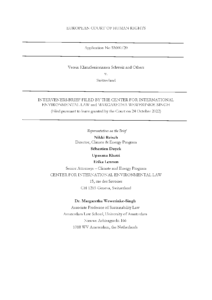
|
South Korean Constitutional Court Landmark Case on the Adequacy of Korea’s Climate Targets to Protect Youth
Aligning Climate Action with Duty to Protect Human Rights and Future GenerationsConstitutional Court of South KoreaSeptember 7, 2021
CIEL submitted an amicus brief in the Constitutional Court of South Korea case Kim Do Hyun et al. v. Korea (Case No. 2020HunMa389) concerning the constitutionality of Korea’s climate regulations and plans. This submission emphasizes climate change as a severe threat to human rights and asserts that States have a duty to protect the rights to life and a healthy environment against climate change threats. The brief advocates for using international human rights and environmental law, emphasizing the rights of future generations and intergenerational equity, and current best available science to assess state actions. It underscores the need for urgent, effective climate policies to safeguard human rights and prevent discrimination against youth and protect the environment for all generations. |

|
